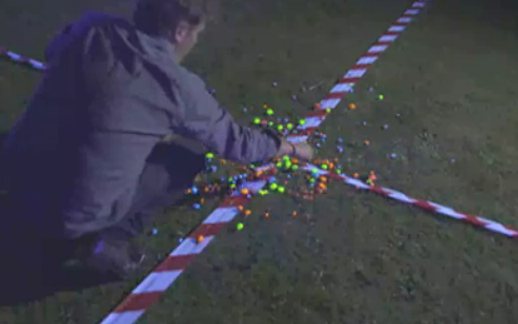Snails have homing instinct and will crawl (slowly) back to motherland if moved, BBC wildlife film proves

For a creature which carries its house on its back, the need for a homing instinct might seem a little redundant.
But for the first time, scientists have proven that snails have their own territories, and will try - albeit very slowly - to make their way back if moved elsewhere.
In a unique experiment designed for the BBC Four's new wildlife programme, The British Garden: Life and Death on Your Lawn, Professor Dave Hodgson of Exeter University, collected 65 snails from a four corners of a garden in Welwyn Garden City, Hertfordshire.
Prof Hodgson painted the molluscs bright fluorescent colours, depending on the corner they had come from, before placing them in the middle of the garden.
A fifth group of snails, brought up from Cornwall was also added to the mix as a control group, and painted bright green .

Once the snails were glowing brightly, they were videoed overnight to find out if they would travel back to their home flower-beds during their nocturnal meanderings. Snails can travel just over one mph and so can get 25 metres in the 24 hours.
"Interestingly, the Cornish ones headed due west, extraordinarily in the right direction to get home," said Prof Hodgson.
"In the blue corner, almost all of the snails I found were blue snails. In the red corner, almost all of the red snails found their way back. In the orange corner almost all of them were orange, and of the pinks almost all of them were back in the pink corner.
"Now this needs some analysis, but as far as I am concerned this is quite spectacular evidence for homing instinct in the garden snail and it's so much better than I could ever have wished."

In recent years, slugs and snails have enjoyed a population explosion due to increasing warm wet weather and favourable breeding conditions. But the new study suggests they are far smarter than previously though.
"They are the enemy of many gardeners because they eat their plants and they are almost indiscriminate in the plants that they eat," added Prof Hodgson.
"The common garden snail not like the insect and other anthropods, it's more closely related to squids, octopuses, limpets and bivalves."

For the new BBC Four film, Chris Packham and a team of wildlife experts spend an entire year exploring every inch of eight gardens on a suburban street in Welwyn to study in detail British gardens as an ecosystem for the first time.
"In truth we probably know more about the ecology of tropical rainforests than we do our back yards," said Packham.
"We're going to answer a fundamental question, Just how many creatures live in your back yard. Just how good is he great British garden when it comes to wildlife."

The team discovered male crickets which bribe females with food during sex, spiders that change colour to help catch prey, and ferocious life-and-death battles going on under our noses in the compost heap.
The programme also shows a different side to some of our familiar garden residents revealing that a robin’s red breast is actually war paint, and a single litter of foxes can have up to five different fathers.
And come Spring, the team witnessed the astonishing sight of a boiling ball of frisky frogs in a once-in-a-year mating frenzy in a garden pond.
The British Garden: Life And Death On Your Lawn, 11th July at 9pm on BBC Four.

 Yahoo News
Yahoo News 
